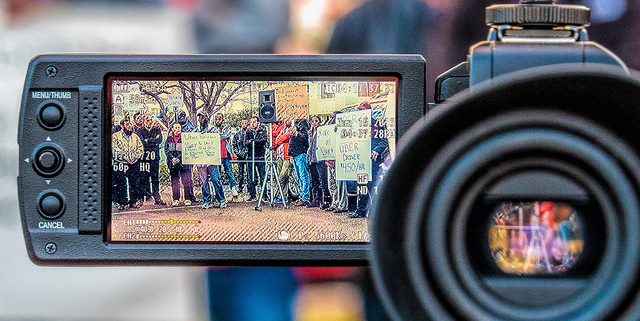5 things to do (and not do) when you make your first film
I felt inspired today to put a few thoughts to paper regarding film making. While I only have one film to my name so far, the experience was magical. It was a lot of hard work, hundreds of late nights, but somehow it all worked out and now the film has been screened 19 times (with many more planned), is being considered by distributors, has attracted a huge amount of press, and is sparking a global conversation about balloons and the more general environmental consequences of our everyday purchases. I am so thrilled. Quite often people ask for me advice about how they should go about making a film – here are a few pieces of advice I would give to any aspiring film maker.
1. Don’t go into debt to make your film.
When you start looking at articles about gear for documentary films, it can be very tempting to credit card your way into tens of thousands of dollars worth of expensive equipment. It’s always a good idea to have the best quality equipment you can afford, and certainly do your research to find out what is going to be the best choice for your budget, but don’t fall into the trap of thinking you need a $20,000 camera to get started. I filmed Rubber Jellyfish on a Cannon 60D which cost me only $1200 (when I purchased it in 2014). I also had a Go Pro which I used occasionally and for sound, a Zoom H1 and two lapel mics – all relatively inexpensive pieces. I do want to upgrade my equipment for my next project but I have no regrets about creating my first film on inexpensive equipment. Having said this, once you work out what you will be filming on, do some practice shots before you do anything important and learn how to use your equipment well.
2. Do be determined.
Documentary films, particularly if it’s your first project, can take a very long time. Be willing for this to happen. A film project is like a marriage in a way and you have to be committed. I made Rubber Jellyfish in my first few years as a mother. Life was hectic and there wasn’t always a whole lot of time. I had a poster board blue tacked to a hallway wall with a big list of everything I wanted to film (which I added to all the time as the story unfolded). I made sure that in my planner I always had at least one, usually two, of the things on that list scheduled. Sometimes this was just a “set up an interview with so and so” or it might be “research helium inhalation statistics” or “interview at 10am with the University of Queensland”. Once I completed a task I would take another from the poster board and add it to my planner to make sure that the project was always moving forward. Eventually, just about everything on that list was ticked off and I had a hard drive of raw material ready for editing.
3. Have a social media presence for your project but don’t give a crap about how many people follow each page/feed.
So many people fall into the trap of worrying about how many “followers” they have. Let me be the first to tell you that this just really doesn’t matter very much. It is much more powerful to have a small amount of followers who are enthusiastic about what you are doing and engaged than it is to have thousands of people who are just vaguely interested or not interested at all (did you know some people actually pay for followers??). Worrying too much about your social media following is an ego trap. Just focus on releasing quality content to engage the people who truly care about what you are doing. This will yield the greatest harvest.
4. Do go to networking events and conferences.
For years and years before I had any kind of success, I would go to lots of film industry networking events. Every state in Australia has a state film agency that organises things like this and then there are other larger events, conferences, and workshops, also. I am assuming most other countries have plenty of film industry events as well. Whenever I would go to these events I felt like a loser. There were so many people there that were so accomplished and I felt like a big dork but I still went and I talked to people. At the workshops and lectures, also, you will learn a lot. Many of these events are free and if you have any interest at all in getting into this field of work, go along to as many as you can and be a sponge.
5. Do stay humble.
There are so many people that will help out a first time film maker. Established film makers are usually happy to pass on words of wisdom, offer advice, point you in the direction of grants you may qualify for, etc. When it comes to setting up interviews and filming scenes, most people are also extremely willing to be involved in film projects. One proviso to this, however, is that nobody wants to deal with a dick. Be friendly, be accommodating, be easy to work with, be nice, be humble. It will get you a long way!!
Thank you to Wayne S. Grazio for the use of this photo under a creative commons license




Leave a Reply
Want to join the discussion?Feel free to contribute!